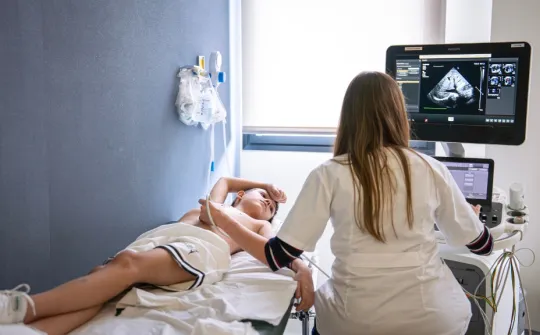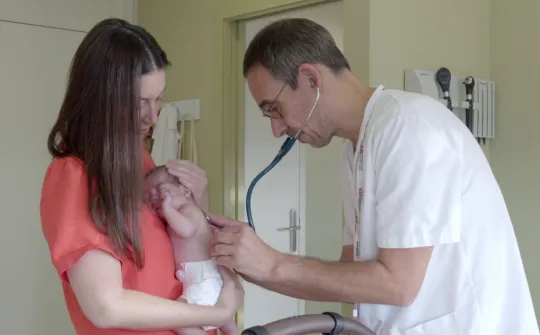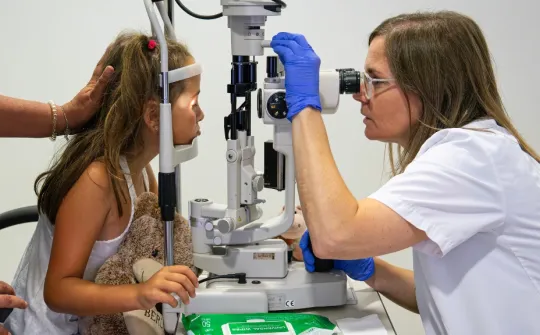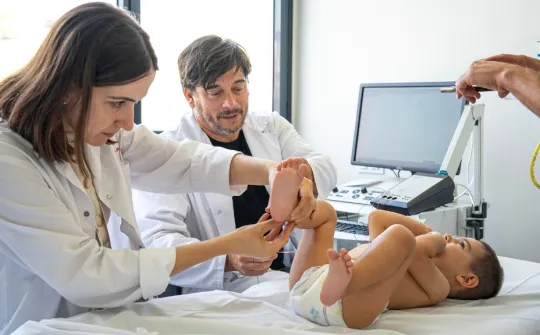
The patient is recovering from the operation, which lasted more than 10 hours and involved 15 members of staff from SJD Barcelona Children’s Hospital’s Neurosurgery team, which operates on over 100 paediatric brain tumours every year.
The team from SJD Barcelona Children’s Hospital’s Neurosurgery Department, who operated on Oliver on Wednesday 2 November this year, was able to remove 98.84% of the brain tumour from the base of the boy’s skull. This was a large posterior fossa tumour with extensive infiltration of the brainstem. The operation was particularly complex due to the large tumour size (7.5 cm), its location (it had invaded the brainstem) and also because of the child’s extremely fragile condition, as he was at high risk of systemic collapse, with unresolved hydrocephalus, and a severe state of dehydration and malnutrition due to his severe neurological impairment.
The team, led by Dr José Hinojosa, operates on more than 100 paediatric brain tumours every year. It is a multidisciplinary unit made up of neurosurgeons, neurophysiologists, anaesthesiologists, radiologists, specialised nurses, intensivists, paediatricians, rehabilitation physicians, physiotherapists and nutritionists, among others.
The team also has the most advanced technology for carrying out operations. Three years ago, SJD Barcelona Children’s Hospital inaugurated a new surgical block that includes, among other devices, an MRI (thanks to a donation from the Asociación Benéfica Anita charity), a CT scanner and a hybrid arch. This technology enables surgeons to define the tumour volume with a high level of precision in order to remove it without damaging key bordering and functional areas of the brain. During Oliver’s surgery, the operating team was able to remove 98.84% of the tumour without causing him any additional side effects, aided by neuronavigation ultrasound and intraoperative neurophysiology, which provides real-time information about the tumour and surrounding areas.
According to Dr José Hinojosa, "only a few hospitals are able to carry out an operation such as this successfully". He added "SJD Barcelona Children’s Hospital is the only paediatric centre in Spain that brings together an experienced care team, state-of-the-art technology and first-class facilities, enabling it to successfully deal with operations of this complexity".
Cancer treatment
The molecular study of Oliver’s tumour allowed it to be identified as a posterior fossa ependymoma, a central nervous system tumour affecting 30 children in Spain every year. There are different types of ependymoma, but the most aggressive, and also the most frequent, is located in the posterior fossa (80% of cases). One in every four Spanish children diagnosed with this tumour are treated at the SJD Barcelona Children’s Hospital’s Oncology Department.
Once he has recovered from the operation, Oliver will start proton radiotherapy in Madrid.
According to the boy’s family, the medical team treating him has decided that he will first receive chemotherapy treatment for a period of two months as part of an international clinical trial. The doctors hope that this treatment will further shrink the tumour or modify its conditions to make it more accessible and facilitate its total removal in a second surgical procedure.



